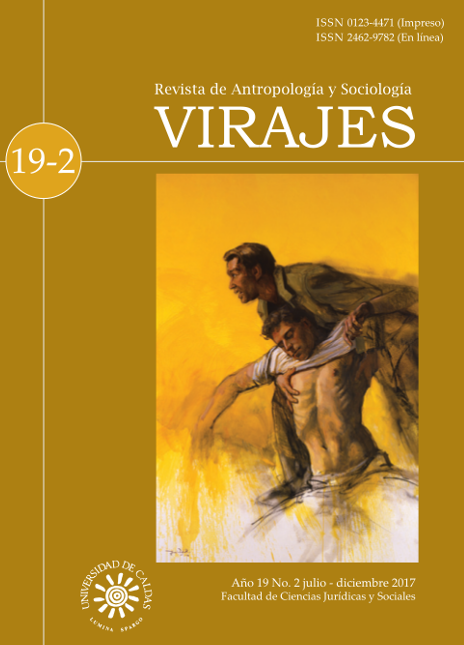Authors
Abstract
Objective: To reflect on two substantial aspects in the unorthodox theory of development presented by Raúl Prebisch and Albert Hirschman that, from their proposal, provoked diverse reactions in the context of the economic theory and, especially, in the economy dominant school of thought. Methodology: This analysis is qualitative. From the authors cited, two substantial categories in their analysis were tracked: from Prebisch, his core-periphery concept; from Hirschman, the idea of linkages in economic processes. To this end, part of the authors’ primary bibliography was reviewed, their theoretical arguments were compared, and they were supplemented with the reflections derived from the recent secondary bibliography query. Results and conclusions: Through the bibliographic research, it was evidenced that the orthodox economic theory did not recognize a theoretical status for the economic theory of development. Therefore, the theoretical achievements of leading development economists ended up being marginal in the context of the post-war economic theory, despite a late recognition for some authors at the end of the 20th century. It is emphasized that among the pioneers of development there are obvious differences but, with dissimilar perspectives, they also present important connections based on the problem of resource allocation.
References
Bértola, L. y Ocampo, J. (2012). Desarrollo, vaivenes y desigualdad. Una historia de América Latina desde la independencia. Madrid, España: SEGIB.
Benavides, O. 2008. De inventores a empresas. La historia económica de la innovación tecnológica. Universidad Externado de Colombia. Bogotá.
Blaug, M. (1962). Economic theory in retrospect. Cambridge, England: Cambridge University Press.
Cardoso, F.H. (1971). Ideologías de la burguesía industrial en sociedades dependientes: Argentina y Brasil. Ciudad de México, México: Siglo XXI editores.
Crafts, N. (2002). Perspectivas históricas sobre el desarrollo. En Meier, G. y Stiglitz, J. (eds.), Fronteras de la economía del desarrollo. Bogotá, Colombia: Banco Mundial, Alfaomega S.A.
De Pablo, J. (2005). Después de Kahneman y Tversky: ¿qué queda de la teoría económica? Revista de Economía y Estadística, 43 (1), 55-98.
Fitzgerald, V. (2000). ECLA and the Theory of Import-Substituting Industrialisation in Latin America. En Cárdenas, O. and Thorp, R. (eds.), Industrialisation and the State in Latin America, An Economic History of Twentieth-Century Latin America (pp. 58-97). Basingstoke, England: Palgrave Macmillan, St Antony’s College.
Gerschenkron, A. (1969). History of economic doctrines and economic history. The American Economic Review, 59 (2), 1-17.
Hirschman, A. (1958). The strategy of economic development. New Haven, USA: Yale University.
Hirschman, A. (1971). A Bias for Hope. New Haven, USA: Yale University.
Landes, D. (1961). Encore le problème de la Révolution Industrielle en Angleterre. Bulletin de las Ciété d’Histoire Moderne, 12 (18), 5-7.
Landes, D. (1990). La riqueza y la pobreza de las naciones. Barcelona, España: Ed. Vergara.
Lewis, W.A. (1956). Theory of Economic Growth. London, England: George Allen & Unwin Ltd.
Love, J. et al. (2001). Entrevista inédita a Prebisch: logros y deficiencias de la CEPAL. Revista de la CEPAL, 75, 9-25.
Mallorquín, C. (2013). Relatos. Ciudad de México, México: Plaza y Valdés.
Meade, J. (1952). External economies and diseconomies in a competitive situation. Economic Journal, XIII, 54-67.
Misas, M., Ramírez, M. y Silva, L. (2001). Exportaciones no tradicionales en Colombia y sus determinantes. Bogotá, Colombia: Banco de la República.
Nurkse, R. (1953). Problems of capital formation in underdeveloped countries. Oxford, England: Blackwell.
Ocampo, J.A. (2011). El auge de los precios de productos básicos y el riesgo de enfermedad holandesa en América Latina. Boletín Informativo Techint, 336, 25-48.
Ocampo, J.A. y Parra, A. (2003). Los términos de intercambio de los productos básicos en el siglo XX. Revista de la CEPAL, 79, 7-35.
Pérez, E. y Vernengo, M. (2012). ¿Una pareja dispareja? Prebisch, Keynes y la dinámica capitalista. Estudios Críticos del Desarrollo, II (3), 158-193.
ollard, S. 1991. La conquista pacifica, la industrialización de Europa. 1760-1970. Trad. Jordi Pascual. Public. de la Universidad de Zaragoza. Zaragoza, 1991
Prebisch, R. (1949). The Economic Development of Latín America and its Principal Problems. Economic Bulletin Far Latin America, 7, 1-22.
Rosenstein, P.N. (1961). Notes on the theory of the “Big Push”. En Ellis, H.S. and Wallich, H.C. (eds.), Economic development of Latin America. London, England: Macmillan.
ostow, W.W. (1960). The Stages of Economic Growth: A Non-Communist. Cambridge, England: University Press.
Sandilans, R. (2015). La misión del Banco Mundial a Colombia de 1949 y las visiones opuestas de Lauchlin Currie y Albert Hirschman. Revista de Economía Institucional, 17 (32), 213-232.
Santiso, J. (2000). La mirada de Hirschman sobre el desarrollo o el arte de los traspasos y las autosubversiones. Revista de la CEPAL, 70, 91-106.
Scitovsky, T. (1954). Two concepts of external economies. Journal of Political Economy, 62, 143-151.
Scitovsky, L., Scott, M. and Little, I. (1971). Industry and Trade in Some Developing Countries. A Comparative Study. The Economic Journal, 81 (321), 144-148.
Schumpeter, J.A. (1968). El análisis del cambio económico. En Clemence, R. (comp.), Ensayos de J. A. Schumpeter. Barcelona, España: Oikos.
Singer, H. (1954). Problems of Industrialization of Underdeveloped Countries. Bulletin International des Sciences Sociales, VI (2), 217-223.
Street, J. y Dilmus, D. (1982). Institucionalismo, estructuralismo y dependencia en América Latina. Comercio Exterior, 32 (12), 1297-1303.
von Tunzelmann, G.N. (1978). Steam Power and British Industrialization to 1860. Oxford, England: Oxford University Press.

 PDF (Español)
PDF (Español)
 FLIP
FLIP


















